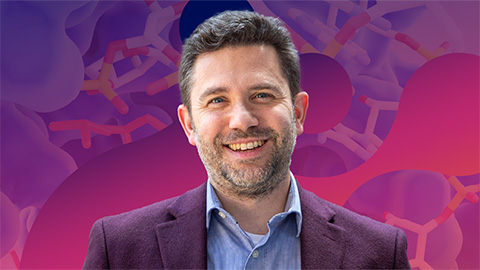JBC: How an interest in bipolar disorder drugs led to a better understanding of leukemia
A research project that began 20 years ago with an interest in how lithium treats mood disorders has yielded insights into the progression of blood cancers such as leukemia. The research, which centers on a protein called GSK-3, was published in the Journal of Biological Chemistry.
Lithium is considered a highly effective treatment for bipolar disorder and other mood disorders, but it still works in only a fraction of patients and has a number of side effects. Furthermore, its mechanism of action is poorly understood, hampering efforts to improve on it.
 A new project reveals that the enzyme GSK-3, a target of the mood disorder drug lithium, has a role in controlling alternative splicing in cells. This observation may yield insights into leukemia. Courtesy of Mansi Shinde and Simone Sidoli
A new project reveals that the enzyme GSK-3, a target of the mood disorder drug lithium, has a role in controlling alternative splicing in cells. This observation may yield insights into leukemia. Courtesy of Mansi Shinde and Simone Sidoli
In 1996, Peter Klein of the University of Pennsylvania discovered that one of lithium’s biological activities was inhibiting GSK-3, an enzyme that modifies other proteins by attaching phosphate molecules, a process called phosphorylation. Lithium’s effect on GSK-3 affected the development of animal cells, but it is still unknown what connection, if any, this has to psychiatric disease.
Since then, Klein — now a professor of medicine at Penn — has been investigating many aspects of GSK-3 activity. “In this paper, we were trying to find out what proteins in the cell are affected by GSK-3 inhibition,” Klein said. “We compared cells with GSK-3 to cells completely lacking GSK-3 to ask how other proteins changed.”
Mansi Shinde, a former graduate student in Klein’s research group, led the new study. “Mood disorders are so multifaceted in terms of the pathways and pathologies involved; it’s really difficult to pin down a specific pathway,” Shinde said. “We said: ‘Let’s look at what GSK-3 does, and that would maybe lead us toward what lithium does.’”
The research team used mass spectrometry to compare phosphorylation of proteins from mouse embryonic stem cells with fully functioning GSK-3 to cells in which the gene encoding GSK-3 had been deleted. The resulting massive data set is called a phosphoproteome — a comprehensive catalog of proteins that are phosphorylated by GSK-3. Analyzing the data yielded some surprising findings.
Conventional wisdom had suggested that GSK-3 phosphorylates proteins that contain a specific amino acid sequence, but the new phosphoproteome showed that the majority of proteins whose phosphorylation depended on GSK-3 did not contain this sequence. Notably, the phosphorylated proteins included a group called splicing factors, which splice together different sections of messenger RNA, changing the proteins they encode. Absence of GSK-3 changed the splicing patterns of more than 200 messenger RNAs.
The finding that GSK-3 could affect RNA splicing pointed to an unexpected connection: leukemia. Several factors newly discovered to be phosphorylated by GSK-3 also are known to be mutated in acute myeloid leukemia, a condition in which aberrant splicing causes uncontrolled white blood cell proliferation. This observation could also explain why one of the side effects of taking lithium is increased white blood cell count.
“The effect on the splicing factors and other mutations associated with leukemia was completely surprising to me,” Klein said. The group now is pursuing investigations into how GSK-3 affects the growth of healthy and leukemic blood cells.
Shinde and Klein are not sure whether GSK-3’s effect on RNA splicing explains its role in mood disorders. The effect of GSK-3 on messenger RNA in neuronal cells, with or without lithium, would need to be examined to determine this. The study underlines how investigations into the basic biological function of a drug target can lead in unexpected directions. The GSK-3 phosphoproteome is “a really large data set,” Shinde said. “It’s a resource for the field.”
“The relevance to leukemia could be direct and something worthy of immediate study,” Klein said. “The role in psychiatric disorders is a major interest of the work, but the impact would be down the road, not immediate.”
Enjoy reading ASBMB Today?
Become a member to receive the print edition four times a year and the digital edition monthly.
Learn moreGet the latest from ASBMB Today
Enter your email address, and we’ll send you a weekly email with recent articles, interviews and more.
Latest in Science
Science highlights or most popular articles

Redefining excellence to drive equity and innovation
Donita Brady will receive the ASBMB Ruth Kirschstein Award for Maximizing Access in Science at the ASBMB Annual Meeting, March 7–10, just outside of Washington, D.C.

Mining microbes for rare earth solutions
Joseph Cotruvo, Jr., will receive the ASBMB Mildred Cohn Young Investigator Award at the ASBMB Annual Meeting, March 7–10, just outside of Washington, D.C.

Fueling healthier aging, connecting metabolism stress and time
Biochemist Melanie McReynolds investigates how metabolism and stress shape the aging process. Her research on NAD+, a molecule central to cellular energy, reveals how maintaining its balance could promote healthier, longer lives.

Mapping proteins, one side chain at a time
Roland Dunbrack Jr. will receive the ASBMB DeLano Award for Computational Biosciences at the ASBMB Annual Meeting, March 7–10, just outside of Washington, D.C.

Exploring the link between lipids and longevity
Meng Wang will present her work on metabolism and aging at the ASBMB Annual Meeting, March 7-10, just outside of Washington, D.C.

Defining a ‘crucial gatekeeper’ of lipid metabolism
George Carman receives the Herbert Tabor Research Award at the ASBMB Annual Meeting, March 7–10, just outside of Washington, D.C.

.jpg?lang=en-US&width=300&height=300&ext=.jpg)